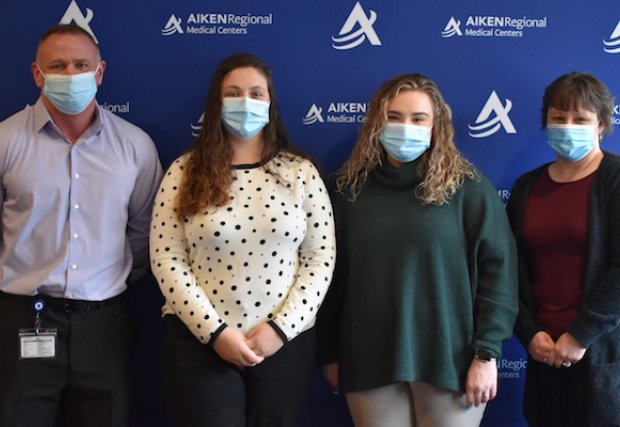Nurse Externship Program Advances Nursing Careers

Aiken Regional Mentoring Consortium's first group of externs graduated in May 2021. They are now employed nurses of Aiken Regional Medical Centers. L to R: David Foisy, Christina Fralick, Carson Leigh Deal and Alison Stevens.
The Aiken Regional Mentoring Consortium Nurse Externship program began in January 2021 and recently graduated its first semester of externs in May. The externship program is available to Aiken Technical College and the University of South Carolina Aiken nursing students during their final semester. Upon acceptance to the program, nursing students commit to two years of employment as a registered nurse with the hospital following completion of the program.
 “The program is a ‘win-win’ for both the students and the hospital,” says Bridget Denzik, DNP, MSN, RN, NEA-BC, Chief Nursing Officer at Aiken Regional Medical Centers, and founder and champion of the program. “It’s a beautiful transition from academia into a professional nursing role and provides the candidate a true picture of what being a clinical bedside nurse is all about. It also provides an opportunity for the nurse to acclimate to the hospital culture and bond with their peers on the unit.”
“The program is a ‘win-win’ for both the students and the hospital,” says Bridget Denzik, DNP, MSN, RN, NEA-BC, Chief Nursing Officer at Aiken Regional Medical Centers, and founder and champion of the program. “It’s a beautiful transition from academia into a professional nursing role and provides the candidate a true picture of what being a clinical bedside nurse is all about. It also provides an opportunity for the nurse to acclimate to the hospital culture and bond with their peers on the unit.”
For more information about the Aiken Regional Mentoring Consortium, call 803-641-5678.
Hands-On Experience With a Nurse Preceptor
The program pairs the nursing student with a seasoned nurse preceptor on a medical-surgical unit. The student follows the nurse preceptor through the course of the semester, receiving hands-on experience and a strong foundation in basic nursing skills.
“Chosen nurse preceptors are experienced nurses who have a passion for teaching. They really go out of their way to make the externs feel welcomed and provide them with the best experience,” says Denzik.
The time on the unit provides the externs the opportunity to obtain certain basic nursing skills that typically they would learn only as a nurse graduate in an entry level RN position. Skills include understanding how to complete a head-to-toe patient assessment, starting an intravenous insertion (IV), drawing blood, and inserting a nasogastric tube (NG) or Foley catheter, if the need arises. By the end of the semester, the externs are able to manage, on their own, a full patient assignment, which includes five to six patients.
In addition to the hours required by the hospital to graduate the program, students complete their final semester practicum hours with their nurse preceptor, amounting to roughly 240 clinical hours in the hospital. Scheduling of the hours varies depending on the individual needs of the student.
“We’re dedicated to making sure the student experiences continued success in their school objectives,” says Denzik. “We partner students with our staff development clinical leader who works with their schedules.”
Application Process
The rigorous application process begins with an informational session offered by the hospital. Applicants then submit a written application, resume, transcripts, letter of interest expressing their commitment to the nursing profession, summary of strengths and weaknesses, and a letter describing why they are a good fit for the program. A letter of recommendation from a clinical instructor is required, and applicants participate in a face-to-face interview with a panel of eight nursing leaders.
“The application process helps us to understand the strengths, interests and personality of the candidate so we can pair them with the right nurse preceptor,” says Denzik. “We’ve found during the interview process that the student may be a really good fit for a certain area, even if they’ve applied for something different.”
Advancing Nursing Careers
Students are paid a stipend for their work at the hospital, as permitted by the South Carolina State Board of Nursing. Upon completion of the program, the nurse extern is employed for two years as a registered nurse on the unit in which they precepted.
“We will continue to help them advance their career beyond the two-year contract in whatever way we can, including partnering them with the correct nursing leader, helping to make additional connections and setting up interviews,” says Denzik. “Given the current nursing shortage across the country, this has been a wonderful way to give back to the nursing students in our community."
Aiken Regional Medical Centers looks forward to welcoming its second cohort of nursing students in August.
